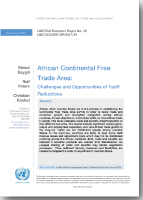
The African Continental Free Trade Area is widely seen as a crucial driver for economic growth, industrialization and sustainable development in Africa. Despite the opportunities, challenges need to be addressed.
Fears of significant tariff revenue losses and an uneven distribution of costs and benefits are among the main obstacles to the continent's integration.
Flanking measures and flexibilities should be explored for a fair sharing of costs and benefits, to reduce adjustment costs and to attain the full long-term benefits of the CFTA.
In the long-run, trade liberalization in the CFTA lowers trade costs and allows consumers to access a greater variety of products at lower prices.
Lower costs for imported raw materials and intermediate inputs increases competitiveness of downstream producers and promotes the generation of regional value chains.
Trade liberalization also allows firms to access a large continental market and gain from economies of scale. In the long run, increased competitive pressures may improve firm efficiency. However, market consolidation may arise when smaller firms are exposed to stiffer competition.
While most of the potential benefits of trade liberalization accrue in the long run, short-run structural change through the relocation of labour, capital and other factors of production entails costs of adjustment.
Short run and long run effects of trade agreements should therefore be distinguished.




